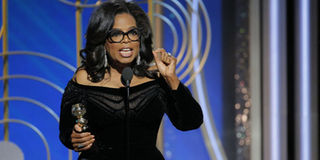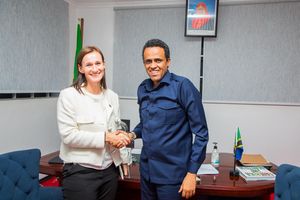TOUGH JUSTICE : When the majority blunder in the name of democracy

What you need to know:
Thanks to Trumps’ chronicles, Americans are now mulling a future president, Oprah Winfrey (pictured), also a billionaire with a background in media. Shortly after receiving her Golden Globe award and delivering an inspirational speech, the world couldn’t resist projecting her name onto the ballot in 2020.
If there was a time politics and entertainment were distinguishable, Donald Trump has either blurred that line or did away with that distinction completely. That a former reality TV star is now occupying the most powerful office on earth is quite telling of how much the field of politics is changing across the world.
Thanks to Trumps’ chronicles, Americans are now mulling a future president, Oprah Winfrey (pictured), also a billionaire with a background in media. Shortly after receiving her Golden Globe award and delivering an inspirational speech, the world couldn’t resist projecting her name onto the ballot in 2020.
While it is hard to call in question Ms Winfrey as a great individual, the idea of her presidency threatens to continue a dangerous trend largely set by the current president – of choosing fame, charisma, and the like over political experience.
Not to sound exclusionist. I simply don’t personally think the mantra “anyone can lead” should not be taken at face value. It should inspire one to self-reflect, and do what it takes to be in a position to be the best leader possible, and not simply seek the position because they have the means and the opportunity. The day’s dynamics have changed in a way that favours celebrities. Fame makes more money now that it ever did, and the same fame can be great political capital, hence giving celebrities the means and the opportunity to run for office. This is happening in Africa too.
In Liberia the duly elected president is a former football star. George Weah remains the undisputed King of African football. Having won the prestigious Ballon d’Or, Fifa World Player of the year, CAF legend award among many other outstanding recognitions, he stands tall in world football’s Hall of Fame.
But are these yardsticks that can make someone fit to safeguard the interest of a nation; develop and implement policies that ensure food security; urban planning and development; reduce poverty, diseases and improve livelihoods among other important things a president is directly responsible for?
In Tanzania, we have Joseph Haule, alias Professor Jay, and Mbilinyi, alias Sugu, in the august house. Across the border in Uganda, celebrated musician Bobby Wine became a legislator, and the script is no different in Kenya where Charles Njagua, popularly known as Jaguar, also made it to parliament. They do seem like a minority, until one considers a host of other celebrities and socialites who have flirted with the idea of running for political office.
While democracy at its core is about the will of the majority, it’s instructive that we ask ourselves hard questions about this majority lest we destroy our countries. If the will of the majority is to prevail, the danger we face, if I am to borrow from biblical literature, is to crucify Jesus and pardon a thief.
To drive my point home, consider this quote from America’s 32nd president, Franklin D. Roosevelt. He once said, “Democracy cannot succeed unless those who express their choice are prepared to choose wisely. The real safeguard of democracy, therefore, is education.”
I am very much inclined to agree with President Roosevelt’s frame of thinking, except that times have changed. Then, education was perhaps the most important and formative institution of socialisation. Since then, media took over, and I am a firm believer that, largely, social media is fast becoming the most influential method tool of our socialisation. Doubting Thomases may say this is only true in the Western world, but I have reason to believe it’s also happening in our continent, thus in a November 2016 edition of this paper, I discuss how social media could have influenced the outcome of our last election.
A study I personally carried out in 2017 showed a negative correlation between exposure to digital communication platforms and political engagement at the local government level. In other words, social media use is more a predictor of disengagement than it is of engagement as many people would want to believe. In my opinion, the democratisation of the production and dissemination of information could be negatively influencing the practice of democracy, and, therefore, we’ve not seen the last of it in “Trumpism”, nor the imminent “Oprah-ism”. Food for thought.




